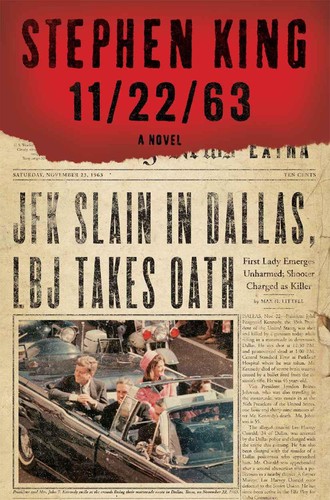Review: 11/22/63 [★★★★☆]
My rating: ★★★★☆
Read From: 27 November 2013—4 December 2013
I have a habit of overcomplicating my reviews. I'll try to keep this one simple. I like this book. A lot. (I would give it five stars except that I'm still annoyed about the completely gratuitous swipe at the Tea Party that King buries in the novel.)
It's a book about the Kennedy assassination but it's not really about the Kennedy assassination. It's about Jacob Epping, an English teacher in Lisbon Falls, Maine. In 2011, he walks through the back of the pantry in the local diner and ends up in 1958. After some reflection, he decides to stick around for the next 5 years, to stop Lee Harvey Oswald before he assassinates President Kennedy. The resulting story is focused heavily on Oswald. I learned a lot about him—his motivations, his mannerisms, and his actions prior to the assassination.
Jacob narrates the entire story, frequently using lots of foreboding foreshadowing. He calls the world of the past "the Land of Ago". Once he really commits to his mission, he's a very driven character. The eponymous date isn't the focus of the book. Jake's journey is. King uses Jake to take a loving, sentimental look at 1950's America. Most of the story takes place in small towns in Maine, Florida, and Texas. It's almost a paean to small town America, in a time long gone.
As someone who never came close to seeing the 1950's or the 1960's, it's an interesting experience. The foods were richer and tasted better. The people trusted each other more. There was much more isolation between cities, towns, and regions. It was easy for someone to start over in an (essentially) new world, just by moving several states away. Because of the isolation, most people seemed far more ignorant of the nation as a whole.
It wasn't all good though. King describes the industrial areas as smelling much worse than they do today. There are also flashes of the ugly racism that was so prevalent during that era. Surprisingly, there was less visible racism than I expected. On reflection, I think that may reflect just how segregated the races were at the time. There isn't much opportunity for daily racism when minorities aren't even around to visibly discriminate against.
As I read the book, I was continually aware of how much was missing from the 1950's, compared to now. The entertainment options were almost painfully limited. There were just three TV channels—if you were lucky enough to live somewhere with good TV reception. The VCR hadn't been invented yet. Your choices were limited to what was on, at that exact moment. There was no way to rewatch favorite movies or TV episodes.
It was harder to communicate with people over a distance, especially when half of the neighborhood might be listening in on a party line. Research and knowledge sharing would have been painfully limited. No internet. No Google searches or Wikipedia lookups. No instant access to history, news archives, or scholarly articles. There was no ability to pull the information you needed whenever you wanted. You either found it at the local library while the library was open or you didn't find it all.
King painted a very attractive, bucolic picture of mid-century America. I don't think I could go back to live in that era. The limited options of the past would feel like a straitjacket now that I've experienced the massive connectedness and resources of our time. Thankfully, I don't have to go back to that era in order to experience a small slice of it. King provides that experience through this excellent story. You won't regret reading it. I sure don't.
This entry was tagged. Book Review Review
